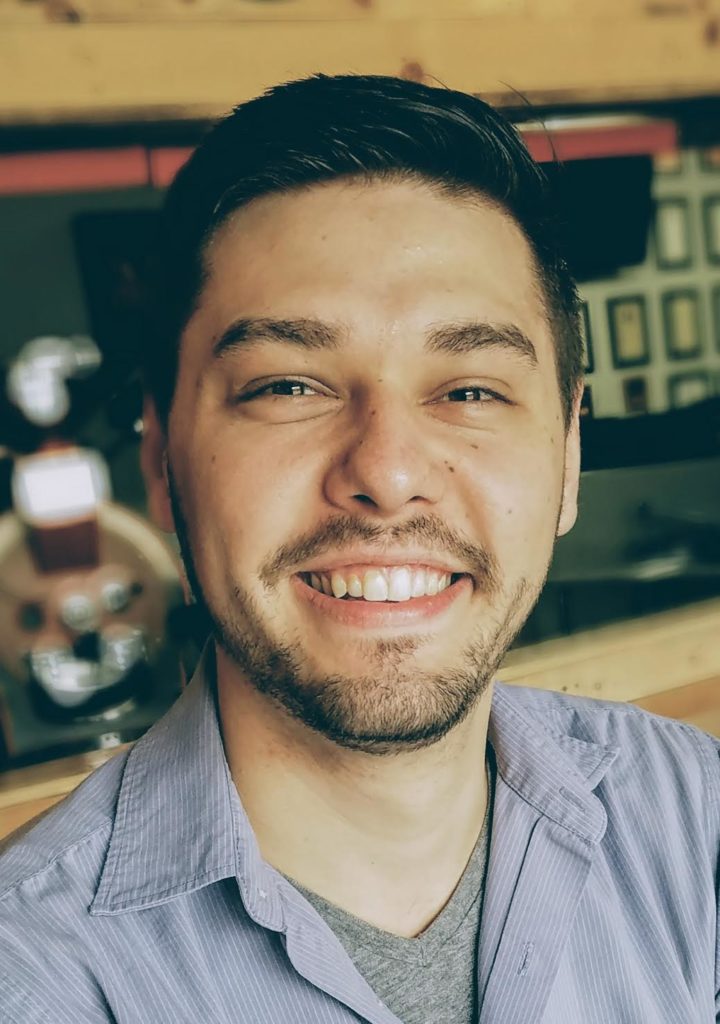Creation as an Act of Reflection

by Phil Weaver-Stoesz
“I don’t really know how to begin,” Michelle says, “Does anyone want to share any memories of Deanne?”
Fourteen theatre creators are sitting in our first rehearsal. It’s 2008, I’m a first year at Goshen College, and a few weeks ago, my friend Deanne died. Many of her friends are in the room – we had acted with her, laughed with her, been irreverent with her.
And now we are all sitting in a circle, on the first day of rehearsal, without her. Our show – The Saint Plays by Erik Ehn – includes a newly written piece that honors and remembers Deanne’s story – her electrifying energy and positivity. Deanne would have resonated with Ehn’s focus on Catholic saints and social justice, which led our director, Michelle Milne, to ask if he had a play about Deanne’s saint. “No,” he had said, “but I can write one.”
So we are gathered. Sitting in a circle, fresh scripts in hand. The room hangs in silence.
The act of creation is not a narrow path. It is not always one of fiction or fantasy. It does not always come from a yearning for self-expression or a struggle for fame. The act of creation can widen to serve as space for memory. As we create, we can enter a space of emotional freedom – the joy of life lived, the sadness of life lost, the strength of connecting outside ourselves.
The work of creating is also one of difficulty, self-doubt, and fear. How do we honor someone in the right way? What if our memory is different from someone else’s?
What if the people mourning share responsibility for the tragedy?
****
I now find myself, once again, creating in a space of lament. This new project, Discovery: A Comic Lament, is a show about land and loss. It explores stories of white settlers ruthlessly and shamefully taking land, destroying lives, and erasing the story of Indigenous Peoples. It invites the audience into a space of laughter at the absurdity of modern law, the insanity of our past, and the tumult of our present.
Through my work on the Saint Plays, I learned about the power of theatre as a tool for memory. But Discovery asks me to take the work deeper.
I learned how to mourn one death, now I am learning to mourn generations of death.
I learned how to laugh at a joyful life, now I am learning to laugh at an absurd past.
I learned how to contend with a lightning strike of grief, now I am learning to contend with a thunderstorm that has raged for generations – that is still raging today.
We are finding our way through the paradox of lamentation and action. At a funeral, there is no undoing what has been done – no one shouts: “bring them back to life! If we fight hard enough, we can do it!” Lamentation invites us to take time for a reality check. The past exists. What has been done cannot be undone.
It’s an uncomfortable place to be. My gut tells me to spring into action – “if I help enough,” it cries “if I do enough, if I create enough change, then the past can be erased!” But the stories are true. The people are real. And the past cannot be changed.
Through Discovery, we are mourning a history, but are we are also opening our eyes to the present. Indigenous tribes are not dead – they still live here, within the nation of their invaders. How may we lament the past? How do we build a better future? And how do we position ourselves, as settlers, in this unfolding story?
We, as white creators, are not alone in this journey. Our partner, Dismantling the Doctrine of Discovery; our expert in restorative justice, Elaine Enns; and local, Indigenous-led groups will be with us on this journey through lamentation, laughter, memory, and the building of a path for a more just future.
Sitting in a circle at Goshen College, our silence is slowly broken:
“Remember how Deanne…” “Deanne would always…” “I loved it when Deanne…”
Her memory was spoken into being – and we learned to carry her energy with us as we created.
Now we stand before a different path. Our hearts ready to mourn, our lungs ready to laugh. We, as settlers, have work to do. We hope, within our process of creation, we can also create a space for memory, a space for painful laughter, and a welcome space for lament.

Dear Phil, and company,
Thanks for your reflections on Lament. I have enjoyed 3 months of daily readings focused on lament, from the Meditation book, Rejoice, put out by Mennonite Media. I grew up not learning much about this practice, but have come to embrace its significance over the past number of years.
Your theme on land and First Nations (the name used for Native Americans in Manitoba, Canada) reminds me when I worked for the 55 or so First Nation Bands of Manitoba. In Manitoba one identity marker is the Band to which you belong (usually associated with one particular piece of land, called a Reserve). I worked for the Treaty and Aboriginal Rights Research Centre of Manitoba off and on from 1982-89. They were involved in researching the Treaties, particularly the ones the Canadian government made with various First Nations in Manitoba, starting with Treaty No. 1 (about 1870).
And it was 4 years later, from 1874-76, that 3,000 Mennonites from Russia settled on the land settled under the terms of Treaty No. 1. This is in southern Manitoba, and the Mennonites also then settled in 2 reserves (block settlements) negotiated with the Canadian government as well. But this Treaty Research center, as governed by the First Nations of Manitoba, then went back to research the Treaties, and to see if all the particular terms had been met through the years, from 1870s to the 1980s. And then new lands were given to particular Bands, if some of the terms had not been met.
I searched on google, and found a link to this organization today.
http://legalhelpcentre.ca/treaty-aboriginal-rights-research-centre-of-manitoba-inc-tarr
I grew up in a small town, Altona, but about 20 miles away was the First Nation Reserve called Roseau River. And in 1974, they visited the Altona Sunflower Festival, and showed the town some First Nation dancing.
Blessings as you explore lament and land.
Sincerely, Dennis Stoesz, Goshen, Indiana USA